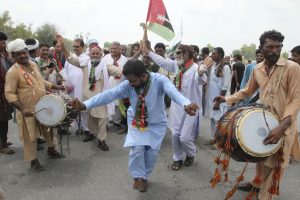In a remarkable achievement, Pakistani javelin thrower Arshad Nadeem not only won the country’s first individual Olympic gold medal but also set a new Olympic record with a huge throw of 92.97 meters.
Before Nadeem’s historic victory in Paris, Pakistan had never won an individual gold medal at the Olympics, with their previous three gold medals coming in field hockey. Even counting the team events, Pakistan had not won a gold medal since 1980, or a medal of any color since 1992.
Nadeem’s triumph not only brought immense pride to Pakistanis but also showcased the country’s sporting potential on the global stage.
For thousands of Pakistanis, Nadeem’s achievement was even more notable because he defeated India’s Neeraj Chopra, who was the defending Olympic champion in the javelin throw event. While some saw Arshad’s throw as avenging Pakistan’s demoralizing loss to India during the recent T20 Cricket World Cup, others saw the milestone as the beginning of a new rivalry between the two South Asian sports giants.
The India-Pakistan rivalry in sports often triggers much excitement but also tension.
In a rare display of sportsmanship, Nadeem and Chopra embraced each other after the competition.
The heartwarming gesture was celebrated across both countries, with Indian cricket legend Ravi Shastri praising Nadeem’s “monstrous and spectacular throw” and Chopra’s mother, Saroj Devi, expressing her happiness for Nadeem’s victory, stating that he was “like her son.”
Similarly, Nadeem’s mother stated in a media interview that Chopra was like her son. “I prayed for him [Chopra] too; he’s like a brother to Nadeem. May God grant him great success,” said Nadeem’s mother.
Even Indian Prime Minister Narendra Modi commended Chopra’s mother for praising Pakistan’s Nadeem, acknowledging the potential for sports to unite the two nations, despite the ongoing political tensions.
However, the harmony was short-lived, as social media platforms were rife with Indian fans questioning the legitimacy of Nadeem’s win at the Olympics, with some calling for drug tests to confirm his fitness. Some social media users went as far as saying that if Chopra could not improve his javelin throw considerably in the last few years, Pakistan’s Nadeem couldn’t have done so as well.
Nadeem’s 92.97-yard throw was so extraordinary that a claim went viral on social media calling on Olympic authorities to conduct a doping test on Nadeem. Reports published in the Indian media claimed that Nadeem was not tested for doping and that Chopra could get the gold medal if the Pakistani athlete failed the drug tests.
However, it’s important to note that all participants, including Nadeem and Chopra, were vetted by the World Anti-Doping Agency (WADA) to ensure fair play and integrity in the Olympic sport.
The Olympics have always been a stage for more than just athletic competition. This year’s games have once again highlighted the political rivalries that extend beyond the playing field. While the India-Pakistan rivalry has dominated the headlines, it’s important to recognize that this is not an isolated phenomenon.
The United States, for example, accused WADA of covering up a doping scandal involving Chinese swimmers. The Chinese athletes, like their Pakistani and Indian counterparts, were subjected to rigorous drug testing during the event.
These tensions between nations extend far beyond the realm of sports and are seemingly tied to global power competitions. For instance, Beijing has accused Washington of trying to systematically maltreat its athletes and politicize the Olympics because the Chinese team won the gold medal by defeating the U.S. in the medley relay swimming competition.
In response to the U.S. allegations, China’s anti-doping agency formally accused the United States Anti-Doping Agency (USADA) of displaying double standards and called for more tests on American athletes.
Despite these allegations and political posturing by countries, the Olympics remain a powerful platform for showcasing the best of human potential.
In this regard, Nadeem’s historic achievement for Pakistan serves as a testament to the power of sports to transcend political boundaries, even if only for a short while. These sporting events should serve as a reminder that there is an opportunity for collaboration and bringing people together rather than creating disputes.

































